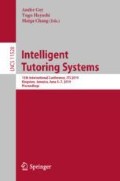Abstract
We propose a model explaining a process of the data analysis in the form of the dual space search: data space and hypothesis space. Based on our model, we developed two hypotheses about the relationship between the search in the data space and two scientific research approaches; hypothesis-driven approach and data-driven approach. Generating a testable hypothesis before an analysis (hypothesis-driven) would facilitate the detailed analyses of the variables related to the hypothesis but restrict a search in the data space. On the other hand, the data analysis without a concrete hypothesis (data-driven) facilitates the superficial but broad search in the data space. The results of our experiment using two kinds of the analysis-support system supported these two hypotheses. Our model could successfully explain the process of data analysis and will help design a learning environment or a support system for data analysis.
Access this chapter
Tax calculation will be finalised at checkout
Purchases are for personal use only
References
De Mast, J., Trip, A.: Exploratory data analysis in quality-improvement projects. J. Qual. Technol. 39(4), 301 (2007)
Jolaoso, S., Burtner, R., Endert, A.: Toward a deeper understanding of data analysis, sensemaking, and signature discovery. In: Abascal, J., Barbosa, S., Fetter, M., Gross, T., Palanque, P., Winckler, M. (eds.) INTERACT 2015. LNCS, vol. 9297, pp. 463–478. Springer, Cham (2015). https://doi.org/10.1007/978-3-319-22668-2_36
Kell, D.B., Oliver, S.G.: Here is the evidence, now what is the hypothesis? the complementary roles of inductive and hypothesis-driven science in the post-genomic era. BioEssays 26(1), 99–105 (2004)
Klahr, D., Dunbar, K.: Dual space search during scientific reasoning. Cogn. Sci. 12(1), 1–48 (1988)
Langley, P.: Data-driven discovery of physical laws. Cogn. Sci. 5, 31–54 (1981)
Pedaste, M., et al.: Phases of inquiry-based learning: definitions and the inquiry cycle. Educ. Res. Rev. 14, 47–61 (2015)
Shute, V.J., Glaser, R.: A large-scale evaluation of an intelligent discovery world: Smithtown. Interact. Learn. Environ. 1(1), 51–77 (1990)
Van Joolingen, W.R., De Jong, T.: Supporting hypothesis generation by learners exploring an interactive computer simulation. Instr. Sci. 20(5–6), 389–404 (1991)
Van Joolingen, W.R., De Jong, T.: An extended dual search space model of scientific discovery learning. Instr. Sci. 25(5), 307–346 (1997)
Acknowledgements
This work was supported by JSPS KAKENHI Grant Number 18H05320.
Author information
Authors and Affiliations
Corresponding author
Editor information
Editors and Affiliations
Rights and permissions
Copyright information
© 2019 Springer Nature Switzerland AG
About this paper
Cite this paper
Matsumuro, M., Miwa, K. (2019). Model for Data Analysis Process and Its Relationship to the Hypothesis-Driven and Data-Driven Research Approaches. In: Coy, A., Hayashi, Y., Chang, M. (eds) Intelligent Tutoring Systems. ITS 2019. Lecture Notes in Computer Science(), vol 11528. Springer, Cham. https://doi.org/10.1007/978-3-030-22244-4_16
Download citation
DOI: https://doi.org/10.1007/978-3-030-22244-4_16
Published:
Publisher Name: Springer, Cham
Print ISBN: 978-3-030-22243-7
Online ISBN: 978-3-030-22244-4
eBook Packages: Computer ScienceComputer Science (R0)

